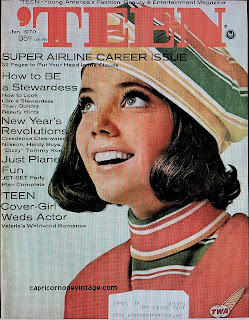When I turned 14, my mom got me a subscription to Teen magazine. I loved the articles, and I learned a lot about how to be in the world. Yes, there were the models in ads who were casually beautiful, but Teen made sure we knew we were fine the way we were. And the magazine eventually got cut up into fun collages or passed on to a friend, so they weren't hanging around intimidating us. I preferred Teen to Seventeen, simply because it made me feel comfortable in my skin.
I'd read Teen when I received it and then it would be another
month before it would show up again. I'm not sure what it would have
been like if a daily issue, with new images and pressures, showed up
every 24-hours.
This is not the way of the world now with smartphones and Instagram in our mix.
In reading The Anxious Generation, I have learned a lot about how girls are affected by smartphones, especially beginning in 2010 when the forward facing camera was introduced. That was an flashpoint. Everything gets recorded and is there forever. The constant drumbeat of new posts and the pressure to be noticed never ends.
Since then, depression rates for girls have skyrocketed, not just in the United States but in European countries and Australia. It has to do with images of beauty -- very often filtered beauty -- which are standards our girls cannot achieve. It has created an out-of-control mental health crisis. No matter who I talk to, they know anxious girls, even as young as 5. It is why nearly every time we have a parent meeting about a girl, anxiety is mentioned.
Last week an 8th
grade girl in my creative writing class turned in a draft of a story called "The Crying Generation."
The main character is a girl terribly stressed about how she looks, who
is feeling ignored by parents who see her as a "pearl" and don't hear
her crying in her room at night. She feels she has to keep putting on a brave face against all odds, and it is wearing on her.
I don't know which is more heartbreaking: the knowledge that smartphones have harmed our kids. Or that the kids know it and now they feel trapped.
Jonathan Haidt, the author of The Anxious Generation, has a Substack page called "After Babel." On it is an essay written by a member of Gen Z. It is well worth reading, and watching the accompanying video. In short, it's about Gen Z feeling nostalgic for a time they never knew. The video is from 1999 when a senior recorded his last day of high school. You can read it here: https://www.afterbabel.com/p/a-time-we-never-knew
All I can say is I'm grateful for the information I'm receiving from Haidt and others, opening my eyes to the depth of this situation. Every parent and educator needs to inform themselves on this, because we need to make a collective effort to change things. I'm on my way to making those changes, and it has renewed my purpose as a teacher.






No comments:
Post a Comment